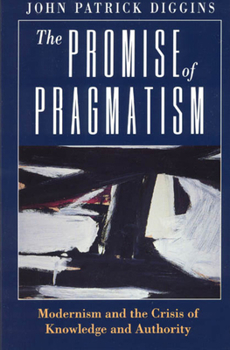The Promise of Pragmatism: Modernism and the Crisis of Knowledge and Authority
Select Format
Select Condition 
Book Overview
For much of our century, pragmatism has enjoyed a charmed life, holding the dominant point of view in American politics, law, education, and social thought in general. After suffering a brief eclipse in the post-World War II period, pragmatism has experienced a revival, especially in literary theory and such areas as poststructuralism and deconstruction. In this critique of pragmatism and neopragmatism, one of our leading intellectual historians traces...
Format:Hardcover
Language:English
ISBN:0226148785
ISBN13:9780226148786
Release Date:May 1994
Publisher:University of Chicago Press
Length:528 Pages
Weight:1.95 lbs.
Dimensions:1.3" x 6.3" x 9.3"
Customer Reviews
2 ratings
Venture into the interior
Published by Thriftbooks.com User , 20 years ago
I was recently informed that Philosophy was assaulted by something like pragmatism at the end of the nineteenth century. And after seeing a Kantian accused of mental derangement for his views it behooved me to prepare a reconaissance expedition into this unfamiliar country. This book more than foots the bill and is a rich vein of information and history on all aspects of this curiously sly descant on the great philosophic tradition. I think its riddle can be lost after excessive familiarity or formalization, and the crux of its mordant bite is best seen at its threshold in the period also recounted in Menand's The Metaphysical Club. This text also brings in a rare insight into Neibuhr, and his interaction with it all. It is no fault of the book that the subject makes me nervous, one needs a quaint disguise to veil 'old fashioned' interest in Kant. One could be put in a straighjacket, you know. I think Dewey's essay on Darwin tells us something about the subject. Did philosophy really need to be rewritten to Darwin's standard? Anyway, while long compared with Menand's The Metaphysical Club, this work was compelling every step of the way. I am ready to write up my field notes on the natives. Good show.
An Historian Looks at Pragmatism
Published by Thriftbooks.com User , 23 years ago
Diggins approaches pragmatism as an historian but with the expert knowledge of a philosopher. He begins with the historian Henry Adams, analyzing his work and its relation to both American culture and American pragmatism and ends with poststructuralism, relating similar themes and techniques between the two geographically and conceptually distinctive philosophies. Diggins also addresses American thinkers not always covered in works on pragmatism: Oliver Wendell Holmes, Sidney Hook, George Mead, Reinhold Niebuhr. In this way he places pragmatism in a much broader context than it usually appears. Pragmatism then becomes not merely a theoretical construct but a product of and an influence on socio-historical reality in America. He places Peirce, James, Dewey, et al. in an historical context, thus making explicit the American culture that went into the development of their thought and the way in which their thought affected American culture and history, not just academia. It is the most impressively comprehensive work on pragmatism I've ever encountered. And that the book was written by an historian, not a philosopher, in my opinion, is only a plus. I say this as a philosopher myself. The perspective of an historian is fresh and illuminating, and the knowledge of the philosophy itself that he demonstrates would rival that of any "official" philosopher. Most interestingly, he ends the book comparing pragmatism and New or Neopragmatism with continental philosophy, especially poststructuralism, drawing provocative parallels and contrasts. The book's only shortcoming is that, in spite of the comprehensiveness lauded above, like most secondary sources on pragmatism, it completely neglects the work of the under-appreciated Alain Locke. But, perhaps, due to the work's historical context, the fact that Locke has been ignored in the rest of culture and academia (more likely due to his race and sexuality than the quality of his philosophy) explains his lack of relevance to Diggins's book.





